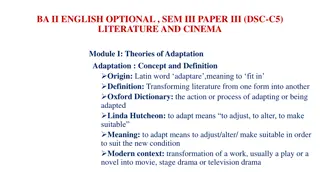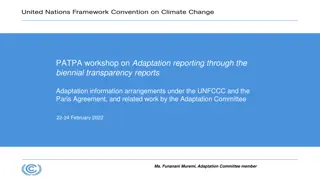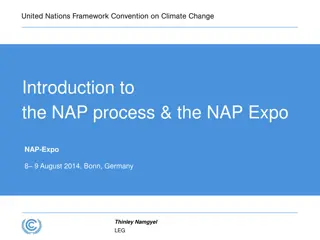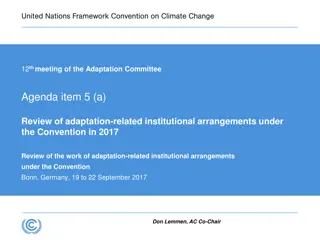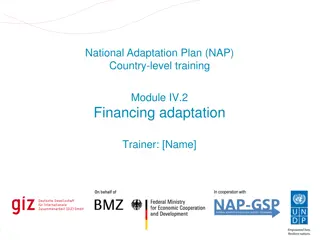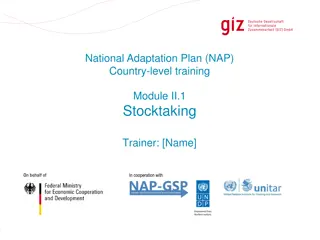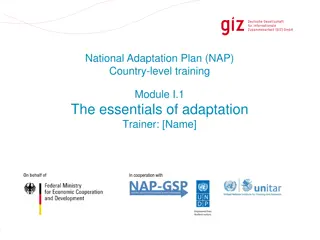Language Attrition and Professional Adaptation
Explore the challenges of language attrition and professional re-immersion, shedding light on the transfer of skills between languages, attitudes towards attrition, and the misconceptions surrounding L1 attrition in professional migrants. This study examines the impact of language change on specialized and general skills, highlighting the need for ongoing language maintenance to stay relevant in today's linguistic landscape.
Download Presentation

Please find below an Image/Link to download the presentation.
The content on the website is provided AS IS for your information and personal use only. It may not be sold, licensed, or shared on other websites without obtaining consent from the author.If you encounter any issues during the download, it is possible that the publisher has removed the file from their server.
You are allowed to download the files provided on this website for personal or commercial use, subject to the condition that they are used lawfully. All files are the property of their respective owners.
The content on the website is provided AS IS for your information and personal use only. It may not be sold, licensed, or shared on other websites without obtaining consent from the author.
E N D
Presentation Transcript
FIRST LANGUAGE ATTRITION AND PROFESSIONAL RE-IMMERSION Monika S. Schmid Centre for Research in Language Development throughout the Lifespan, University of Essex languageattrition.org languageattrition @MonikaSSchmid
TRANSFER OF SKILLS BETWEEN LANGUAGES the paradox of professional migrants: we are aware that we need to learn the language skills underpinning professional skills acquired in a native language (L1) but if training and experience was done only in a second language (L2), we tend to assume we can also do it in our L1 being a native speaker is regarded as a kind of birthright
TRANSFER OF SKILLS BETWEEN LANGUAGES there are three problems with this assumption: specialised skills do not develop by themselves languages change, so even intact knowledge may no longer be up to date general skills may erode over time, due to non-use (L1 attrition)
ATTITUDES TO ATTRITION many people believe that attrition does not exist but is an affectation people who are publicly seen to have experienced L1 attrition are usually mocked and/or insulted on social media
ATTITUDES TO ATTRITION 20.1.2018
ATTITUDES TO ATTRITION 3.4.2018
ATTITUDES TO ATTRITION many people believe that attrition does not exist but is an affectation
ATTITUDES TO ATTRITION many people believe that attrition does not exist but is an affectation including people who, two months earlier, claimed to experience it themselves what chance have we got ?
WHAT TO EXPECT WHEN YOURE ATTRITING you may produce: sentences that go badly wrong very disfluent speech (pauses, hesitations, uhm etc.) borrowings and switches inappropriate language (request-making, politeness) a more or less pronounced foreign accent very weird expressions
WHY IS THIS A PROBLEM? we gauge other people s functioning (cognitive skills, intellect, capability, ) based on how they speak this has a big impact for L2 users but it can also be a problem in the native language
FLUENCY AND HESITATION all naturalistic spoken speech has disfluencies (pauses, erm, fillers such as like , you know etc.) not all of these are indicative or problems of retrieval or speech production (they also structure the message) attriters use more hesitations, some of them in places where monolinguals don t appear less confident (and, therefore, less competent) Schmid, Monika S. & Kristy Beers F gersten. (2010) Fluency and language attrition. Language Learning 60:4, 753-791.
VOCABULARY attriters tend to overuse more frequent words and underuse rarer ( more sophisticated ) ones a broad vocabulary is often used to dazzle and create an impression of expertise appear less expert and less intelligent Schmid, Monika S. & Scott Jarvis (2014) Lexical first language attrition. Bilingualism: Language and Cognition 17(4), 729-748.
GRAMMAR attriters sometimes have a preference for more straightforward grammatical structures main clauses instead of subordinate ones can reduce the processing load (easier to keep track) some languages have different word order in main and subordinate clauses (easier to stick to one pattern) John was tired. He went home. John went home because he was tired. can create impression of less analytic/strategic thinking
GRAMMAR attriters sometimes have a preference for more straightforward grammatical structures overt vs. null pronouns Where is John? He s at the hotel. D nde est Juan? Est en el hotel. (lit.: Is at the hotel. ) D nde est Juan? l est en el hotel. overt pronoun would not be used unless contrastive or emphatic attriters have tendency to overuse pronouns where monolinguals wouldn t can create impression of overstating the obvious, not being attuned to informational needs of interlocutor G rel, Ay e. (2002). Linguistic characteristics of second language acquisition and first language attrition: Turkish overt versus null pronouns. PhD dissertation, McGill University Montr al.
WEIRD THINGS MIGRANTS SAY structures and idiomatic expressions are literally translated: English: to run for office, to run short of something Spanish: *correr para gobernador German: *ich renne kurz an Briefpapier
MORE SUBTLE ASPECTS OF ATTRITION attrition does not just concern vocabulary, accuracy or fluency each language has its own conventions and (mostly) unwritten rules on how to interact for example: familiar and polite pronouns (the T-V distinction) many languages make this distinction
PRONOUNS OF ADDRESS English I English French je French German German ich Spanish Spanish yo Dutch ik Dutch you tu du t jij he, she, it il, elle er, sie, es l, ella hij, zij, het we nous wir nosotros wij you vous ihr vosotros jullie they ils/elles sie ellos, ellas zij
PRONOUNS OF ADDRESS English I informal English French je French German German ich Spanish Spanish yo Dutch ik Dutch you tu du t jij he, she, it il, elle er, sie, es l, ella hij, zij, het we nous wir nosotros wij you vous ihr vosotros jullie formal they ils/elles sie ellos, ellas zij
PRONOUNS OF ADDRESS English I informal English French je French German German ich Spanish Spanish yo Dutch ik Dutch you tu du t jij he, she, it il, elle er, sie, es l, ella hij, zij, het we nous wir nosotros usted wij you vous ihr vosotros jullie formal they ils/elles sie ellos, ellas zij
PRONOUNS OF ADDRESS English I informal English French French je German German ich Spanish Spanish yo Dutch Dutch ik you tu du t jij he, she, it il, elle er, sie, es l, ella hij, zij, het u we nous wir wij usted nosotros you vous ihr jullie formal vosotros they ils/elles sie zij ellos, ellas ustedes
WHEN TO USE THESE PRONOUNS it s complicated! e.g. German:
https://htwkbk.files.wordpress.com/2010/01/du-oder-sie-a-simple-visual-guide.pdfhttps://htwkbk.files.wordpress.com/2010/01/du-oder-sie-a-simple-visual-guide.pdf
WHEN TO USE THESE PRONOUNS it s complicated! e.g. Dutch: many people use formal pronoun to address grandparents and parents (unthinkable in German, linked to age and background) married couple: he addresses his own parents with formal pronoun, she addresses her in-laws with informal e.g. French: Simone de Beauvoir, Les Mandarins: husband uses tu to wife, she uses vous to him
WHEN TO USE THESE PRONOUNS can be difficult even for monolinguals tricky for attriters for three reasons: we have changed (we are older than when we left, may have different social position) our language has changed (we are used to the conventions of our second language) the language of our home country has changed (many languages have trend towards more use of informal) however, getting it wrong can be disastrous!
EVEN MORE SUBTLE ASPECTS OF ATTRITION politeness isn t just a matter of pronouns, of course: I can only fall silent because thirty seconds into the conversation, I have already failed at an important task: while I was bowing and saying hello, I was supposed to have been calculating the other person s age, rank, and position in order to determine how polite I should be for the rest of the conversation. (Mori, K. 1997. Polite Lies: On being a woman caught between two cultures. New York: Henry Holt.)
STILL MORE SUBTLE ASPECTS OF ATTRITION we use language to establish relationships and demarcate our roles in these relationships choice of style, body language etc. vary depending on which role we are in we learn how to project a professional persona due to experience (most of us have never been taught this) it is a dangerous fallacy to assume such knowledge translates between languages!
MORE STILL MORE SUBTLE ASPECTS OF ATTRITION styles and conventions of (professional) interaction vary between languages: body space/distance how to make a polite request how to offer to do something the way this is done in one language can appear rude, pushy, overly ingratiating, in another
SO, WHAT SHOULD WE DO...? not this!
SO, WHAT SHOULD WE DO...? not this! nor this!
SO, WHAT SHOULD WE DO...? become aware of what is going on if you have to write an important letter, ask someone to read it if you have to speak your native language in an important setting (e.g. job interview) rehearse the situation if possible, immerse yourself in the language for a few days beforehand don t be afraid to say if you cannot remember a word or are unsure what it means
SO, WHAT SHOULD WE DO...? and if people still don t believe you, send them here: https:/languageattrition.org www.facebook.com/languageattrition



